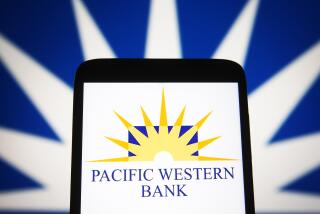Qwest Takes Beating After Unsolicited Bids
- Share via
Investors in Qwest Communications International on Monday pummeled the Denver phone company’s stock one day after the firm moved to buy US West Inc. and Frontier Corp. and break up pending deals with rival Global Crossing Ltd.
Reacting to Qwest’s unsolicited offer for a stock swap, announced Sunday, Wall Street sent shares of the upstart telecommunications company down $10.75, substantially reducing the value of its bids for the two phone companies.
In one day, the combined value of Qwest’s double offer fell from $55 billion to $43 billion. Global Crossing’s offer for Frontier has remained near the original value of $11.2 billion; its offer for US West has dropped to about $30.4 billion, down from $37 billion last month.
Because both companies plan to make the purchases using stock, market reaction to the bids could ultimately determine the winner.
But investors don’t seem to like either matchup. In Monday trading on Nasdaq, Qwest’s stock price closed at $34.13, while Global Crossing shares fell 38 cents to close at $50.38. Global Crossing’s share price has dropped 16% since it announced its US West merger deal last month.
Frontier’s stock price rose $1.94 to $57.38, while US West shares rose $3.13 to $58. Both trade on the New York Stock Exchange.
Right now, the two offers for US West are nearly the same, noted Mel Marten, an analyst with EdwardJones in St. Louis. “Qwest’s offer seems to be better overall, but it’s going to depend on how the market prices these deals.”
Representatives from Rochester, N.Y.-based long-distance provider Frontier and Baby Bell US West of Denver said their boards are reviewing the Qwest proposals and have declined to comment further.
But in an internal memo to Global Crossing employees, Chief Executive Robert Annunziata outlined the advantages of the company’s bids and said, “When the dust settles, we are confident that our original deals will go forward.”
Under terms of the deal, Qwest’s proposal would give US West shareholders as many as 1.783 shares of Qwest stock for each US West share--a value of as much as $60.85 per share, based on Monday’s closing price. Under Global Crossing’s bid, US West shareholders would receive 1.2 Global Crossing shares for each US West share--a value of $60.45 per share.
Qwest’s offer for Frontier would give shareholders $20 in cash and as many as 1.226 shares of stock for each Frontier share--a value of $61.84 as of Monday. Global Crossing’s March offer would give Frontier shareholders $63 per share in stock, with Global Crossing’s stock price required to stay within a certain range.
“The more people think that Global Crossing will stick with these deals, the more the stock goes down--and the more unlikely it is that they could up their offer and beat Qwest,” said Linda Varoli, a research analyst with New York-based Merger Insight. The same is true for Qwest.
Fast-growing Qwest said it launched its surprise takeover efforts to bulk up its customer base and expand its reach to allow it to challenge telecommunications giants, such as AT&T.;
As the nation’s fourth-largest long-distance company, Qwest is building a strong presence in data transmission. But it needs more if it wants to survive in today’s bigger-is-better telecom industry.
Global Crossing, which has executive offices in Los Angeles, gave similar reasons when it clinched deals to buy US West last month, and Frontier in March. The company is best known for its ambitious plans to build an undersea telecommunications network.
US West, long considered the least attractive of all the Baby Bell phone companies, nonetheless has been aggressively pushing data services and has a base of 25 million customers in its 14-state territory.
Frontier, already a major Qwest customer, is a long-distance provider with a solid data business and a local phone network in New York.
More to Read
Inside the business of entertainment
The Wide Shot brings you news, analysis and insights on everything from streaming wars to production — and what it all means for the future.
You may occasionally receive promotional content from the Los Angeles Times.










